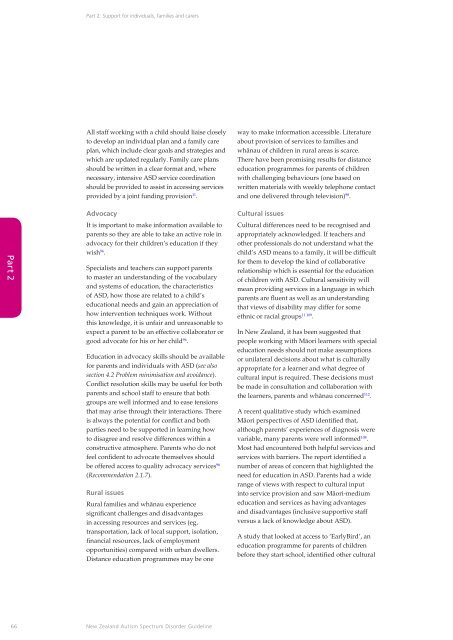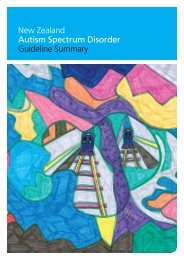New Zealand Autism Spectrum Disorder Guideline - Ministry of Health
New Zealand Autism Spectrum Disorder Guideline - Ministry of Health
New Zealand Autism Spectrum Disorder Guideline - Ministry of Health
Create successful ePaper yourself
Turn your PDF publications into a flip-book with our unique Google optimized e-Paper software.
Part 2: Support for individuals, families and carers<br />
All staff working with a child should liaise closely<br />
to develop an individual plan and a family care<br />
plan, which include clear goals and strategies and<br />
which are updated regularly. Family care plans<br />
should be written in a clear format and, where<br />
necessary, intensive ASD service coordination<br />
should be provided to assist in accessing services<br />
provided by a joint funding provision 11 .<br />
way to make information accessible. Literature<br />
about provision <strong>of</strong> services to families and<br />
whänau <strong>of</strong> children in rural areas is scarce.<br />
There have been promising results for distance<br />
education programmes for parents <strong>of</strong> children<br />
with challenging behaviours (one based on<br />
written materials with weekly telephone contact<br />
and one delivered through television) 98 .<br />
Part 2<br />
Advocacy<br />
It is important to make information available to<br />
parents so they are able to take an active role in<br />
advocacy for their children’s education if they<br />
wish 96 .<br />
Specialists and teachers can support parents<br />
to master an understanding <strong>of</strong> the vocabulary<br />
and systems <strong>of</strong> education, the characteristics<br />
<strong>of</strong> ASD, how those are related to a child’s<br />
educational needs and gain an appreciation <strong>of</strong><br />
how intervention techniques work. Without<br />
this knowledge, it is unfair and unreasonable to<br />
expect a parent to be an effective collaborator or<br />
good advocate for his or her child 96 .<br />
Education in advocacy skills should be available<br />
for parents and individuals with ASD (see also<br />
section 4.2 Problem minimisation and avoidance).<br />
Conflict resolution skills may be useful for both<br />
parents and school staff to ensure that both<br />
groups are well informed and to ease tensions<br />
that may arise through their interactions. There<br />
is always the potential for conflict and both<br />
parties need to be supported in learning how<br />
to disagree and resolve differences within a<br />
constructive atmosphere. Parents who do not<br />
feel confident to advocate themselves should<br />
be <strong>of</strong>fered access to quality advocacy services 96<br />
(Recommendation 2.1.7).<br />
Rural issues<br />
Rural families and whänau experience<br />
significant challenges and disadvantages<br />
in accessing resources and services (eg,<br />
transportation, lack <strong>of</strong> local support, isolation,<br />
financial resources, lack <strong>of</strong> employment<br />
opportunities) compared with urban dwellers.<br />
Distance education programmes may be one<br />
Cultural issues<br />
Cultural differences need to be recognised and<br />
appropriately acknowledged. If teachers and<br />
other pr<strong>of</strong>essionals do not understand what the<br />
child’s ASD means to a family, it will be difficult<br />
for them to develop the kind <strong>of</strong> collaborative<br />
relationship which is essential for the education<br />
<strong>of</strong> children with ASD. Cultural sensitivity will<br />
mean providing services in a language in which<br />
parents are fluent as well as an understanding<br />
that views <strong>of</strong> disability may differ for some<br />
ethnic or racial groups 11 109 .<br />
In <strong>New</strong> <strong>Zealand</strong>, it has been suggested that<br />
people working with Mäori learners with special<br />
education needs should not make assumptions<br />
or unilateral decisions about what is culturally<br />
appropriate for a learner and what degree <strong>of</strong><br />
cultural input is required. These decisions must<br />
be made in consultation and collaboration with<br />
the learners, parents and whänau concerned 112 .<br />
A recent qualitative study which examined<br />
Mäori perspectives <strong>of</strong> ASD identified that,<br />
although parents’ experiences <strong>of</strong> diagnosis were<br />
variable, many parents were well informed 108 .<br />
Most had encountered both helpful services and<br />
services with barriers. The report identified a<br />
number <strong>of</strong> areas <strong>of</strong> concern that highlighted the<br />
need for education in ASD. Parents had a wide<br />
range <strong>of</strong> views with respect to cultural input<br />
into service provision and saw Mäori-medium<br />
education and services as having advantages<br />
and disadvantages (inclusive supportive staff<br />
versus a lack <strong>of</strong> knowledge about ASD).<br />
A study that looked at access to ‘EarlyBird’, an<br />
education programme for parents <strong>of</strong> children<br />
before they start school, identified other cultural<br />
66<br />
<strong>New</strong> <strong>Zealand</strong> <strong>Autism</strong> <strong>Spectrum</strong> <strong>Disorder</strong> <strong>Guideline</strong>











